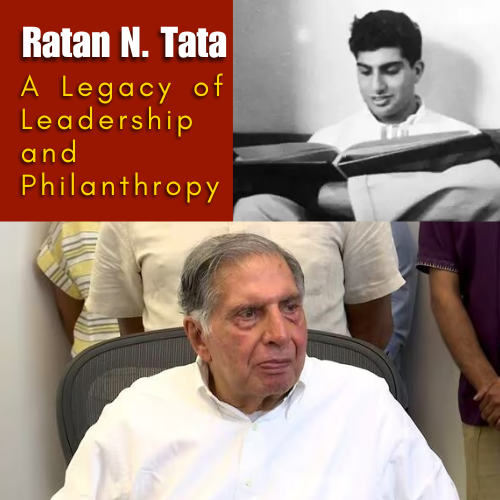Ratan N Tata’s name reflects his philanthropy, ethics and leadership. Former Chairman of Tata Sons, Ratan Tata, one of India’s most famous businessmen, transformed the Tata Group into an international conglomerate. This article explores his life story and highlights his service to the country’s business community. Future generations will be greatly inspired by Ratan N Tata’s leadership and philanthropic legacy.
Grew up in the Tata group and became a leader
Born on December 28, 1937, Ratan Tata began his career at the bottom of the Tata Group in 1962. He is the founder of J.R.D. After attending Tata Cornell University and Harvard Business School, he advanced Became chairman of Tata Sons in 1991 Tetley Tea, Corus Steel and Jaguar Land Rover were among the profitable acquisitions that helped the Tata Group grow internationally under its watch…
His bold choices helped build Tata Motors into a global brand. Strengthening the Tata group of companies in areas such as steel, automobiles, technology and telecommunications, his most famous endeavor was the development of the Tata Nano with the aim of providing cheap transportation services to the masses of India.
Ratan N. Tata’s Commitment to Charity
People know Ratan N. Tata for his economic acumen. However, his charitable and social activities are as significant. Much of the company’s wealth is held in the Tata Trusts, which are managed by Tata Sons. Many initiatives in the field of governance have received funding from Ratan Tata. these funds support rural development, health, and education. to improve millions of Indians’ quality of life.
The COVID-19 pandemic has been the time when he has contributed most significantly. Tata Trusts engages in a variety of humanitarian projects. from obtaining pharmaceuticals to assisting in the creation of vaccinations. An excellent illustration of the notion that a company’s success should extend beyond financial success is Tata’s commitment to social welfare.
Global Impact and Ethical Guidance
N. Ratan Tata’s steadfast dedication to ethics and integrity was a hallmark of his leadership style. Sustainability rather than short-term profits was always his first priority. To ensure that all Tata decisions are consistent with our core principles of responsibility, fairness and trust…
His leadership during the crisis Including the 26/11 attacks at the Tata-owned Taj Mahal Palace Hotel in Mumbai, Ratan Tata personally visited the victims’ families. and expressed his deepest condolences to his colleagues and colleagues. …Watching them being taken care of Strengthening his reputation as a leader who puts people before profit. I have fulfilled my obligation.
Legacy and future consequences
Ratan N Tata’s leadership and philanthropic contributions will live on, and despite stepping down as chairman of Tata Sons in 2012, his impact continues to be felt in India’s corporate sector. He has a strong desire to help business owners in need. and has invested in many startup companies in India’s burgeoning technology sector A new generation of Indian business leaders who are reshaping the country are empowered by his guidance and mentorship.
In addition to joint business investments Ratan Tata’s dedication to leveraging the organization’s resources for social benefit. It also serves as a model for other organizations. in India as well His charitable and ethical business practices ensure his legacy will live on for many years to come.
Meet together as a group
Ratan N Tata’s life is an example of how social responsibility and professional prosperity can coexist. His philanthropic endeavors and leadership skills have not only made the Tata Group a global powerhouse, however, it has also provided millions of Indians.
Learn more about Tata Trusts and their philanthropic work.





I do not even know how I ended up here, but I thought this post was great. I do not know who you are but certainly you’re going to a famous blogger if you aren’t already 😉 Cheers!
гарантия при продаже аккаунтов магазин аккаунтов социальных сетей
маркетплейс аккаунтов https://marketplace-akkauntov-top.ru/
заработок на аккаунтах маркетплейс аккаунтов соцсетей
платформа для покупки аккаунтов купить аккаунт
магазин аккаунтов социальных сетей https://prodat-akkaunt-online.ru/
маркетплейс аккаунтов соцсетей маркетплейс аккаунтов
биржа аккаунтов купить аккаунт
Accounts market Accounts for Sale
Account Trading Platform Guaranteed Accounts
Account marketplace Online Account Store
Account Trading Platform Account Buying Platform
Sell Account Buy accounts
Account Trading Service Accounts for Sale
Account Acquisition Buy and Sell Accounts
Account Buying Platform Account Buying Platform
Account Store Website for Buying Accounts
Account Selling Service Gaming account marketplace
Buy Account Account market
account selling platform account purchase
account trading platform secure account sales
website for selling accounts buy and sell accounts
account marketplace purchase ready-made accounts
account store online account store
account selling platform account acquisition
account trading platform account purchase
social media account marketplace account market
account trading platform account store
secure account purchasing platform account marketplace
account buying service https://socialaccountsshop.com
social media account marketplace account market
verified accounts for sale gaming account marketplace
find accounts for sale account selling service
accounts marketplace account market
online account store account buying service
guaranteed accounts account marketplace
database of accounts for sale account marketplace
account marketplace profitable account sales
secure account purchasing platform database of accounts for sale
database of accounts for sale https://marketplace-social-accounts.org
account market ready-made accounts for sale
sell accounts sell pre-made account
account market account store
account trading website for selling accounts
buy and sell accounts account exchange
website for selling accounts account marketplace
account exchange find accounts for sale
buy accounts https://accounts-offer.org/
account exchange service https://accounts-marketplace.xyz/
database of accounts for sale https://buy-best-accounts.org/
incrível este conteúdo. Gostei muito. Aproveitem e vejam este site. informações, novidades e muito mais. Não deixem de acessar para saber mais. Obrigado a todos e até a próxima. 🙂
guaranteed accounts https://social-accounts-marketplaces.live
account trading platform https://accounts-marketplace.live
buy pre-made account https://social-accounts-marketplace.xyz
guaranteed accounts https://buy-accounts.space
buy account https://buy-accounts-shop.pro
account buying platform https://buy-accounts.live
accounts for sale https://social-accounts-marketplace.live
account trading platform https://accounts-marketplace.online/
account acquisition https://accounts-marketplace-best.pro
маркетплейс аккаунтов соцсетей https://akkaunty-na-prodazhu.pro
биржа аккаунтов https://rynok-akkauntov.top
площадка для продажи аккаунтов маркетплейсов аккаунтов
маркетплейс аккаунтов соцсетей https://akkaunt-magazin.online/
маркетплейс аккаунтов соцсетей маркетплейсов аккаунтов
купить аккаунт https://kupit-akkaunty-market.xyz/
площадка для продажи аккаунтов https://akkaunty-optom.live/
биржа аккаунтов https://online-akkaunty-magazin.xyz
продать аккаунт akkaunty-dlya-prodazhi.pro
магазин аккаунтов маркетплейсов аккаунтов
cheap facebook accounts buy facebook advertising accounts
buy facebook account for ads https://buy-ad-accounts.click
buy a facebook ad account https://buy-ad-account.top/
buy ad account facebook facebook ad account buy
buy facebook accounts cheap https://ad-account-buy.top
facebook ads accounts https://buy-ads-account.work
buy ad account facebook buy facebook advertising accounts
buy facebook accounts facebook account sale
buy facebook accounts https://ad-accounts-for-sale.work
buy google adwords account https://buy-ads-account.top
buy verified google ads accounts https://buy-ads-accounts.click
facebook account buy buy fb ads account
google ads reseller sell google ads account
buy adwords account https://ads-account-buy.work
buy account google ads https://buy-ads-invoice-account.top
buy google ads threshold account buy google ads agency account
google ads account for sale https://buy-ads-agency-account.top/
buy aged google ads account buy aged google ads accounts
buy aged google ads accounts buy account google ads
buy fb bm https://buy-business-manager.org
buy adwords account https://buy-verified-ads-account.work
buy verified bm https://buy-bm-account.org/
buy facebook verified business manager https://buy-business-manager-acc.org
buy fb bm facebook business manager account buy
buy facebook business manager account https://buy-verified-business-manager.org/
facebook bm account https://business-manager-for-sale.org/
buy verified facebook business manager https://buy-business-manager-verified.org/
facebook business manager account buy https://buy-bm.org
buy facebook business manager verified https://verified-business-manager-for-sale.org
tiktok ad accounts https://buy-tiktok-ads-account.org
tiktok agency account for sale https://tiktok-ads-account-buy.org
tiktok agency account for sale https://tiktok-ads-account-for-sale.org
tiktok ad accounts https://tiktok-agency-account-for-sale.org
tiktok ads agency account https://buy-tiktok-ad-account.org
buy tiktok ads account tiktok agency account for sale
buy tiktok business account tiktok ads account for sale
tiktok agency account for sale https://buy-tiktok-business-account.org
tiktok ads account buy https://tiktok-ads-agency-account.org
Эта публикация завернет вас в вихрь увлекательного контента, сбрасывая стереотипы и открывая двери к новым идеям. Каждый абзац станет для вас открытием, полным ярких примеров и впечатляющих достижений. Подготовьтесь быть вовлеченными и удивленными каждый раз, когда продолжите читать.
Подробнее – https://nakroklinikatest.ru/
This design is incredible! You most certainly know how to keep a reader amused. Between your wit and your videos, I was almost moved to start my own blog (well, almost…HaHa!) Wonderful job. I really enjoyed what you had to say, and more than that, how you presented it. Too cool!
cheap facebook accounts account market secure account sales
buy fb ad account marketplace for ready-made accounts buy account
Very nice article and straight to the point. I am not sure if this is in fact the best place to ask but do you guys have any ideea where to get some professional writers? Thx 🙂
It is actually a great and helpful piece of information. I am satisfied that you shared this useful information with us. Please stay us informed like this. Thanks for sharing.
I have read several good stuff here. Certainly worth bookmarking for revisiting. I wonder how much effort you put to create such a excellent informative web site.
I have been checking out some of your stories and i can claim pretty good stuff. I will definitely bookmark your site.
I really enjoy looking at on this internet site, it has good posts. “It is easy to be nice, even to an enemy – from lack of character.” by Dag Hammarskjld.
I enjoy your piece of work, appreciate it for all the good content.